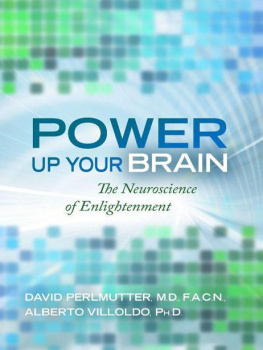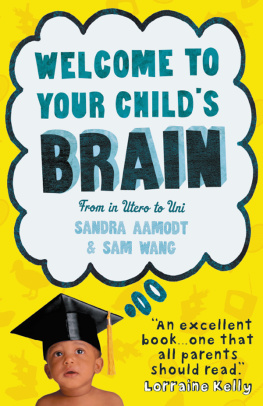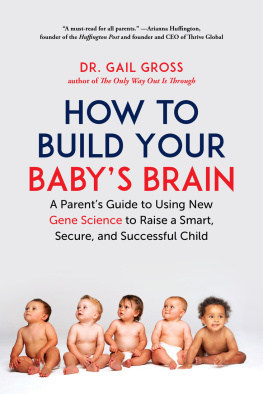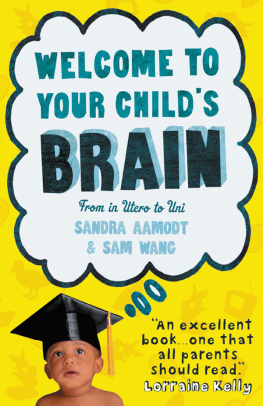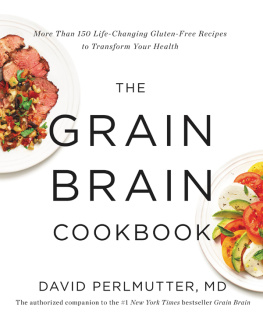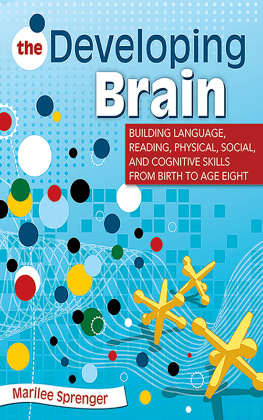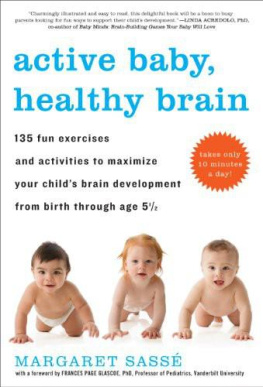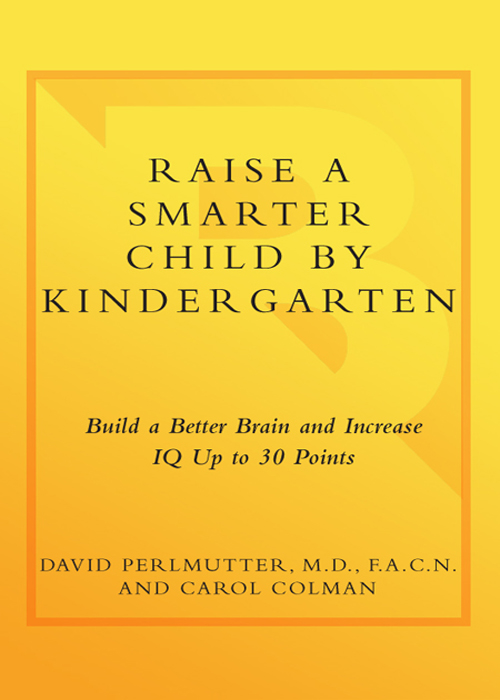
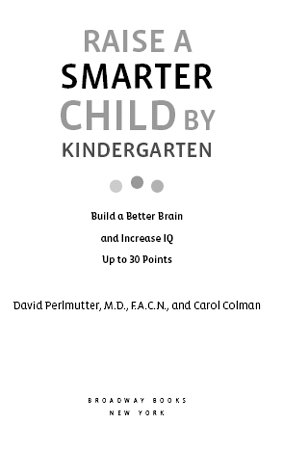
CONTENTS
PART I
A BRIEF WINDOW OF OPPORTUNITY
PART II
SHARPENING YOUR CHILDS MIND FROM CRIB TO CLASSROOM
PART III
NUTRITION FOR A SMARTER BRAIN
PART IV
CREATING A BRAIN-ENHANCING ENVIRONMENT FOR YOUR CHILD
PART V
THE BRAINBODY CONNECTION: COMMON MEDICAL CONDITIONS AND VACCINATIONS THAT CAN AFFECT YOUR CHILDS BRAIN
PART VI
FIGHTING ADHD BY BUILDING A BETTER BRAIN
Raise a Smarter Child by Kindergarten is dedicated to
parents. You have chosen to accept the most sacred
responsibility of humankind.
You are the bows from which your children as living arrows are sent forth.
Khalil Gibran,
The Prophet
Visit Dr. Perlmutters blog: RenegadeNeurologist.com
ACKNOWLEDGMENTS
I would like to thank Amy Hertz, publisher of Morgan Road Books, for her wisdom, energy, and enthusiasm, as well as her continued devotion to our goals. I have a great sense of confidence knowing that youre guiding the process along the way. Many thanks to our literary agent, Janis Vallely, for her continuing support at all stages of this process. I am grateful to Marc Haeringer and Julie Miesionczek of Morgan Road, who have worked tirelessly on this project and continue to do so. Special thanks to Rebecca Holland, publishing director and executive managing editor, for making this much needed book happen so quickly and for shepherding it through the process.
I am very grateful to Anna Belle Fore, manager of the Perlmutter Health Center, for her seemingly effortless ability to bring tranquility to the otherwise overwhelming challenges of our complex day.
Finally, Id like to thank my wife, Leize, for her encouragement and understanding in all my endeavors, as well as our children, Austin and Reisha, for allowing us to experience the joy of parenthood.D.P.
PART I

A BRIEF WINDOW OF OPPORTUNITY
CHAPTER ONE
The Smart Advantage
W hat does it take to raise a smarter child? What must parents do during the first five years of life to ensure that their child is primed to excel in school and in life?
The good news is, raising a smarter child is easier than you think. It doesnt require making an investment in expensive equipment or high-priced tutors. Nor do you have to devote every waking minute to demanding academic drills. There are easy (and I do mean easy) yet highly effective strategies that can vastly improve your childs brain power. Its as simple as playing the right games with your child, putting the right food on your childs plate, maintaining a brain-enhancing environment in your home, and last but not least, giving your child lots of love.
Im a neurologist, a physician who specializes in disorders of the brain and nervous system. At my offices at the Perlmutter Health Center in Naples, Florida, I have worked with both children and adults for more than twenty years. I am also a father of two teenage children. Over the past five years, there have been incredible breakthroughs in the field of neurosciencesparticularly in the area of early childhood developmentthat have given us a new understanding of how the brain develops.
Science now tells us that the human brain is unfinished at birth. Theres a brief window of opportunity in a childs life when parents can help create a brain that is built for optimal performance. Your childs future depends on how well you do that job. If you do your job well, you will raise a smarter child who will fulfill his or her full intellectual potential.
When I was in medical school, the prevailing scientific view was that the brain you are born with is your brain for life. This belief has now been refuted. New and more effective imaging techniques have provided a window into the brain that has enabled us to see how the brain changes throughout our lifetime. We now know that the human brain is undergoing a constant and dramatic transformation from birth until about age 5 and, to a lesser extent, throughout our entire lives. The brain can be shaped and molded well into adulthood and even into old age, but the most important work is done in early childhood. And thats when parents can make the biggest impact on the lives of their children.
During the peak time of brain development, every activity and experience leaves an indelible mark on your babys brain, for better or worse. The right kind of stimulation will create connections in the brain that promote intelligence and emotional stability. The wrong kind of stimulationor lack of stimulationcan stifle intellectual development, destroy brain cells, and leave your child more vulnerable to learning or behavior problems down the road.
Some of you may be thinking: Isnt intelligence largely determined by genetics? Wont smart parents automatically have smart children? And if thats true, what can you do about your childs genes? We now know that for the most part, great brains are made, they are not born. From birth to age 3, up to 30 IQ points are up for grabs. Children may be born with the genetic potential to have a higher than average IQ, but if they are not properly nurtured and nourished during the first few years of life, they will not achieve their full potential. What parents door fail to docan win or lose IQ points.
DONT LET YOUR CHILD MISS OUT
Lots of well-meaning parents are missing key opportunities to enhance their childrens intellectual and emotional well-being, not because they are derelict in their duties, but because they are not fully informed.
There are simple ways you can make your child smarter and make sure that those precious IQ points dont go down the drain.
Breast-feeding your baby for the first twelve months of life can boost her IQ by up to 8 points. If you cant breast-feed or have to stop early, be sure to use a commercial infant formula that is fortified with brain-boosting nutrients.
Feed your toddler an optimal diet to enhance brain growth. Even a slight deficiency in a key vitamin, mineral, or nutrient (such as iron or iodine) during the time when the brain is going through its spectacular growth spurt can result in a lower IQ, poor test scores, depression, and even teen drug abuse down the road.
Engage your baby in mentally stimulating activities from the first few weeks of life through her entire childhood. The right games and activities can improve her memory, boost her mental capacity, and hone her critical thinking skills.
Limit the amount of time your child spends watching TV and DVDs and playing video games. Excess time spent watching TV and playing video games during early childhood adds up to poor grades at school.
Introduce your child to formal musical training by age 4. It will make him a stronger math and science student.
Early training on a computer can improve your childs cognitive function and better prepare him for school.
Protect your child from common brain toxins found in food, toys, clothing, and even your own backyard that can cause learning problems and rob her of IQ points.
Raise your child in a warm, loving, low-stress environment with attentive caregivers.
Every choice a parent makes, from what to feed a child, to how much TV a child watches, to the choice of caregiver can profoundly affect a childs brain growth and development. And so much of your childs brain development is under your control.
Next page

